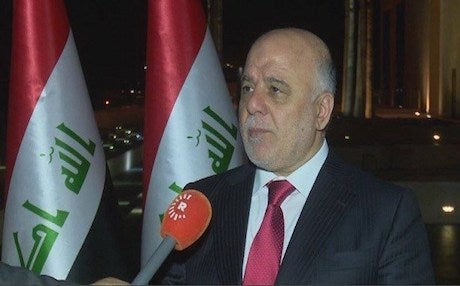Rudaw staff
Iraq’s Prime Minister Haider al-Abadi says Kurdish media have encouraged the killing of Iraqi troops and therefore they’re committing war crimes. The reality is that the Kurdish media, chief among them Rudaw, have worked to uncover crimes committed by Iraqi forces and militia groups, most recently in the war against ISIS. You know a media outlet has done something right when you’ve to make up accusations and look for an excuse to shut it down.
Iraq’s media commission has also advised government institutions, especially the military, to prevent Rudaw teams from carrying out their work anywhere in the country and seize their staff and equipment. Iraqi authorities, Mr. Abadi among them, must remember that Rudaw reporters and cameramen risked their lives to cover their operations against ISIS in Mosul, Qayyarah, Baiji, Ramadi and Fallujah round the clock. One of the network’s most prominent anchors Shifa Gardi lost her life in Mosul when she was trying to tell the world the crimes of this extremist group against the Iraqi people.
Iraqi military and government officials, including Mr. Abadi himself, often appeared on Rudaw and conveyed their messages to the world. With its multilingual media platforms Rudaw has been a major source of news for the outside world. Rudaw television featured Iraqi soldiers in their drive for the liberation of their country. And when hundreds of thousands of civilians were displaced or massacred by ISIS Rudaw was always on the forefront to carry their voices to the world.

Iraqi Prime Minister speaking to Rudaw TV during the Arab Summit in Jordan. Apr. 2017
Sectarianism is not at play at Rudaw. Designing and airing special programs to promote ethnic and religious coexistence has been one of the workings of this network. Shiite and Sunni leaders, clerics, experts and ordinary citizens have appeared on Rudaw on a regular basis. Our reporters in Baghdad, Basra, and Ramadi have sought out people with a story to tell. Rudaw reporters have traveled to international conferences to meet Iraqi leaders and get their views on air.
It is ludicrous that Mr. Abadi is now accusing the Kurdish media of inciting violence while his government threatens to shut down Rudaw. Not only is this a major affront to freedom of press, it is nothing but a step by yet another Iraqi leader to stifle freedom of press. Some of the recent victories in the battle have perhaps given Baghdad this air of confidence that it could remove the free media as the final barrier to absolute rule.
If he indeed is worried about incitement of violence Mr. Abadi should perhaps look into myriads of radio and television channels that spew out sectarian hatred day and night without any regulation or oversight. His government should try to close down those social media pages that encourage revenge killings in broad daylight. A reliable media outlet in Iraq is a rare thing. Most are owned and steered by militia groups, political parties, businessmen and clerics who have fanned the flames of Iraq’s sectarian war with deadly consequences.
Rudaw is one outlet that has kept away from this contaminated world of sectarian politics and covered the news from every corner of Iraq. In Rudaw the people of Iraq and politicians have found a medium to speak to each other.
The Iraqi government’s animosity towards Rudaw started at the turn of events last month and the advance of the army and Hashd al-Shaabi into Kirkuk and other towns across the Kurdistan Region border. All Rudaw has done is covering the news and the flight of civilians. Our cameras rushed to meet Shiite and Sunni civilians when they fled ISIS, too.
We hope Mr. Abadi does not start to go after journalists and media outlets because it will only kill the last chance for democracy in Iraq. We too are against incitement of violence and irresponsible reporting. But we stand by our belief that free press helps build a strong country and a healthy political environment.




Comments
Rudaw moderates all comments submitted on our website. We welcome comments which are relevant to the article and encourage further discussion about the issues that matter to you. We also welcome constructive criticism about Rudaw.
To be approved for publication, however, your comments must meet our community guidelines.
We will not tolerate the following: profanity, threats, personal attacks, vulgarity, abuse (such as sexism, racism, homophobia or xenophobia), or commercial or personal promotion.
Comments that do not meet our guidelines will be rejected. Comments are not edited – they are either approved or rejected.
Post a comment